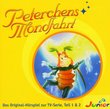| All Artists: Maurizio Pollini Title: Beethoven: Piano Sonatas NOS. 1-3, OP. 2 Members Wishing: 0 Total Copies: 0 Label: Deutsche Grammophon Original Release Date: 1/1/2008 Re-Release Date: 1/22/2008 Genre: Classical Styles: Chamber Music, Forms & Genres, Sonatas, Historical Periods, Classical (c.1770-1830), Romantic (c.1820-1910) Number of Discs: 1 SwapaCD Credits: 1 UPC: 028947765943 |
Search - Maurizio Pollini :: Beethoven: Piano Sonatas NOS. 1-3, OP. 2
 | Maurizio Pollini Beethoven: Piano Sonatas NOS. 1-3, OP. 2 Genre: Classical
Maurizio Pollini continues his celebrated cycle of Beethoven Piano Sonatas. In this album, recorded like its predecessors in Munich's Herkulessaal, the Italian pianist turns his incomparable keyboard mastery to Opus 2, the... more » |
Larger Image |
CD DetailsSynopsis
Album Description Maurizio Pollini continues his celebrated cycle of Beethoven Piano Sonatas. In this album, recorded like its predecessors in Munich's Herkulessaal, the Italian pianist turns his incomparable keyboard mastery to Opus 2, the three astonishingly individual, inventive and forward-looking sonatas comprising Beethoven's first publication in the genre, dedicated to his teacher Joseph Haydn. Composed in 1793-95, just after he went to Vienna and while he was still chiefly making his name as a pianist, Beethoven's Op. 2 needs no apology for coming first in the series of 32. In scope, variety and dramatic power, these sonatas are already authentically Beethovenian--bold, brilliantly virtuosic and, in the slow movements, often profoundly expressive works which, deservedly, have always been popular among pianists and music lovers. Pollini, a living legend, has received countless accolades for his interpretations of the Beethoven sonatas, and there is every reason to believe that this new recording will be similarly acclaimed. Writing about Pollini's previous album of Beethoven sonatas, including the "Pathétique," Stephanie von Buchau of the Oakland Tribune found that "Pollini gives a heart-stopping performance" while Jessica Duchen in Classic FM exclaimed, "there is a deliciously youthful quality about his playing of early Beethoven in this enchanting disc. His touch is light and sparkling...every moment is compelling." Similar CDs
|
CD ReviewsOne-sided Beethoven WHM | Amsterdam | 03/25/2008 (3 out of 5 stars) "I think the late Harold C. Schonberg, influential critic for the NY Times, was the first to characterize Maurizio Pollini as a "cult figure" and "intellectual pianist" to whom musical color, charm, personality and emotion have little meaning. "Don't interpret, but just play the notes" was the then modern style of Pollini. "Cool perfection, impersonal sound and computer-like total control" according to Schonberg (The Great Pianists, Ch.37; 1987). These memorable words were written two decades ago, but they haven't lost their meaning. Now over 65, Pollini still is a cult figure with countless admirers (his concerts are immediately sold out, even if he only plays Stockhausen and Boulez; and read the uncritical five-star reviews here at Amazon). Being a cult figure is fine, but did Pollini change as a musician over the years? He surely became milder and more expressive, but at the same time he has maintained his reputation of a pianist whose playing lacks emotional content, warmth and depth. Gifted with a vast technique, Pollini can play anything with breathtaking tempi, flawless, and no mannerism or show-off whatsoever. Yet he is musically one-sided and emotionally aloof. He never tempts. Everything is done the same way - never a surprise. Regrettably, his recording of Beethoven's Op. 2 (or Op. 10 for that matter) is no exception. The opening of the F minor sonata (Allegro) is a breathless chase of events. No time for musical eloquence. The Menuetto (Allegretto) is rushed and lacks grace, not least because of exaggerated fortissimo's. In the fourth movement, the fine melodic line that starts from bar 35 (right hand octaves) is neglected. Yes, it is prestissimo, but that's no excuse for ignoring a melody that should sing. Plain-sailing pianism. Slow movements are the real touchstones. The beautiful Largo Appassionato of the A major sonata is too detached and crisp to my ears. To quote Gramophone: "Even in the slow movements, Pollini can be authoritarian, barking his orders at you with inflexible resolve". The Scherzo is rushed again (played Allegro instead of Allegretto) with too much pedal, while there is a conspicuous lack of humor in the Rondo Grazioso (Pollini and humor mix like water and oil; listen to Brendel for the humor and grace in this movement). Again lots of nervous intensity and little humanity in the C major sonata. These recordings are fine for the many worshippers of Pollini; for more musical eloquence and virtues others should look elsewhere. Looking elsewhere is not a challenge given the countless fine recordings of these sonatas. If you find the sound of the legendary Arthur Schnabel unacceptable, listen to Wilhelm Kempff, Claudio Arrau, Annie Fischer or Emil Gilels. The latter is my favorite; Gilels' Op. 2/2 is deeply moving and unsurpassed (unfortunately, he did not record no. 1). Murray Perahia also did a great job with his very musical and insightful interpretation of Op. 2. Newcomer Paul Lewis shouldn't be overlooked either (his Vol.3 of the Beethoven sonatas). A world of difference with Pollini. " Unconditionally recommended..superb recording..every dynamic Peter B. Behr | New York, NY, USA | 02/27/2008 (5 out of 5 stars) "The sonic transparency of this recording, with its fully-realized dynamic range and splendid sense of three-dimensional sound stage, is the next best thing to actually being present in a very good seat in the Herkulessaal in the Residenz in Munich. Maurizio Pollini's deep knowledge of Beethoven's music and life are clearly evident in this masterfully satisfying account of the three Op. 2 sonatas. Every dynamic and note just sound convincingly right. I think this is superb recording of a performance that Beethoven - who was of course an exceptional pianist too - could like very much. It is full of charm, wit and fresh surprise. The elegant playing is informed by what I can only describe as confidence born of humility. It is never mannered or dry. Unconditionally recommended for those who come to these sonatas for the first time, as well as those familiar with other recorded accounts." Pollini has reached a remarkable plateau of mastery Santa Fe Listener | Santa Fe, NM USA | 01/22/2008 (5 out of 5 stars) "Pollini was wise to save Beetoven's Op. 2 piano sonatas for late in his complete cycle, having begun with the late sonatas over three decades ago. He's achieved such ease and mastery that these early works roll off his fingers with silken effortless that masks a lifetime's attention to touch and insight -- I doubt any contemporary can match him at this point. One can alight on any single movement, such as the Adagio of Op. 2 no. 1, and the variety of tone, the eloquence found in simplicity, testify to a rare match of artist and composer. Or consider the arpeggiated runs in the Rondo finale to Op. 2 no. 3, which define that cliche, a gossamer touch.
The product description and first reviewer here at Amazon try to sell Op. 2 as dramatic, fully realized Beethoven, but in truth there's plenty of Haydnesque classicism in them. What's so marvelous is that Pollini doesn't make the music sound backward-looking, much less dainty. He achieves a feeling of Beethoven's strength without pumping the music up. It's a matter of poise and balance, allowing Beethoven's special excitement peek through whenever it appears. (Richter, who also favored early Beethoven, tended to punch it out and play over-aggressively at times, although that can be exciting in its own right, of course.) Probably this CD will appeal in the end mostly to Beethoven completists, Op. 2 being overshadowed by the "name" sonatas of the middle period and the revolutionary accomplishment of the late period. But to anyone who loves Pollini, here's an installment in his cycle that brings as much admiration and delight as any of the others." |

 Track Listings (12) - Disc #1
Track Listings (12) - Disc #1

